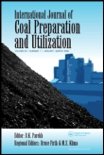
International Journal of Coal Preparation and Utilization
Scope & Guideline
Leading the charge in coal research and environmental stewardship.
Introduction
Aims and Scopes
- Coal Preparation Techniques:
Research on various methods for preparing coal, including flotation, gravity separation, and drying processes, aimed at maximizing the recovery of clean coal and minimizing environmental impact. - Coal Utilization Research:
Studies focusing on the effective use of coal, including combustion, gasification, and co-firing with biomass, to enhance energy output while reducing emissions. - Environmental Impact Assessments:
Investigations into the environmental implications of coal mining and usage, including studies on ash management, CO2 sequestration, and the mitigation of spontaneous combustion. - Innovative Separation Technologies:
Development and optimization of advanced separation methods, such as hydrocyclones, flotation columns, and novel chemical additives to improve coal cleaning efficiency. - Material Characterization and Analysis:
Exploration of the physicochemical properties of coal and coal by-products, including studies on mineralogy, ash composition, and the behavior of coal under different processing conditions. - Advanced Computational Modeling:
Application of machine learning and computational fluid dynamics (CFD) to model coal preparation processes, predict outcomes, and optimize operational parameters.
Trending and Emerging
- Sustainability and Clean Coal Technologies:
A significant increase in research dedicated to sustainable coal use, including carbon capture and storage, cleaner combustion methods, and the role of coal in a low-carbon energy future. - Advanced Analytical Techniques:
Emerging use of machine learning, artificial intelligence, and advanced imaging techniques for coal characterization and separation processes, indicating a move towards data-driven research. - Coal-Water Slurry and Rheology Studies:
Growing interest in the behaviors and properties of coal-water slurries, particularly in relation to transportation and processing efficiency, reflecting the need for improved coal utilization methods. - Coal-Gangue Recognition Technologies:
Increasing focus on the development of image processing and machine learning methods for the identification and separation of coal and gangue, enhancing operational efficiency. - Bio- and Eco-Friendly Additives:
Research into the use of natural and biodegradable additives in coal processing and flotation, aiming to minimize environmental impacts and improve process sustainability. - Integration of Biomass with Coal:
Emerging studies on the co-utilization of biomass and coal, exploring synergies and benefits in terms of emissions reduction and energy efficiency.
Declining or Waning
- Traditional Coal Mining Techniques:
Research focused on conventional mining methods has seen a decline, potentially due to the industry's shift towards more sustainable and technologically advanced extraction methods. - Basic Coal Quality Assessment:
Studies that solely assess coal quality without integrating advanced analytical techniques or environmental considerations are less frequent, indicating a transition towards more comprehensive and innovative approaches. - Low-Tech Flotation Processes:
The exploration of basic flotation processes without the incorporation of novel chemical agents or advanced modeling techniques appears to be waning, as newer technologies gain traction. - Coking Coal Studies:
Research specifically centered on coking coal has diminished, suggesting a broader interest in diverse coal types and their applications in various energy production processes. - Conventional Combustion Technologies:
The focus on traditional coal combustion technologies is declining as research increasingly emphasizes cleaner and more efficient alternatives, such as gasification and biomass co-firing.
Similar Journals
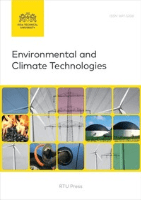
Environmental and Climate Technologies
Exploring Frontiers in Environmental Science and Renewable Energy.Environmental and Climate Technologies is a premier open-access journal dedicated to advancing knowledge in the fields of environmental science and renewable energy. Published by SCIENDO since 2009, this journal plays a crucial role in disseminating innovative research and interdisciplinary studies that address the pressing challenges posed by climate change and sustainable development. With its current positioning in the Q2 quartile for Environmental Science (miscellaneous) and Q3 for Renewable Energy, Sustainability and the Environment, it is recognized for its significant contributions to the academic community, ranking #107 out of 233 in General Environmental Science and #161 out of 270 in Renewable Energy. Hailing from Germany and operating under an open-access policy, Environmental and Climate Technologies ensures that research remains accessible to a global audience, fostering collaboration and discussion among researchers, professionals, and students alike. The journal invites rigorous scientific inquiries and practical solutions that can mitigate the impact of climate-related issues, making it a vital resource for those committed to environmental stewardship and sustainability.
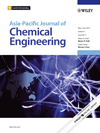
Asia-Pacific Journal of Chemical Engineering
Fostering Interdisciplinary Research for a Sustainable Future.The Asia-Pacific Journal of Chemical Engineering, published by WILEY, serves as a vital forum for the dissemination of innovative research in the interdisciplinary domains of chemical engineering, renewable energy, sustainability, and waste management. Established in 2006, this esteemed journal has achieved a notable impact factor that reflects its commitment to advancing knowledge and practices within the chemical engineering community. With its Q3 category rankings across various fields, including Chemical Engineering (Miscellaneous), Renewable Energy, Sustainability and the Environment, and Waste Management and Disposal, the journal holds a significant position among its peers, assuring readers of quality and relevance in published content. Although it does not offer Open Access options, the Asia-Pacific Journal of Chemical Engineering remains an essential resource for researchers, professionals, and students aiming to stay at the forefront of innovations affecting the Asia-Pacific region and beyond. The journal's broad scope covers diverse topics, making it an integral part of the academic landscape from 2006 to 2024.
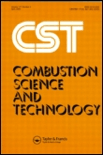
COMBUSTION SCIENCE AND TECHNOLOGY
Fueling Knowledge in Chemical EngineeringCOMBUSTION SCIENCE AND TECHNOLOGY, published by Taylor & Francis Inc, is a pivotal journal in the fields of Chemical Engineering and Chemistry, with a robust history spanning from 1969 to 2024. With an established impact factor and a strong reputation reflected in its Q2 ranking in both Chemical Engineering and Chemistry, this journal serves as an essential resource for researchers and professionals dedicated to the intricacies of combustion processes and energy technologies. The journal also holds commendable rankings in Energy Engineering, Fuel Technology, and Physics and Astronomy, showcasing its interdisciplinary relevance. While currently not an open-access publication, it offers a wealth of knowledge through its meticulously peer-reviewed articles, which are crucial for advancing understanding and innovation in combustion science. With a commitment to promoting rigorous research and fostering scholarly communication, COMBUSTION SCIENCE AND TECHNOLOGY is indispensable for anyone seeking cutting-edge insights into combustion phenomena and their applications in various engineering fields.
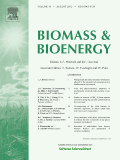
BIOMASS & BIOENERGY
Fostering Interdisciplinary Insights in BioenergyBIOMASS & BIOENERGY, published by Pergamon-Elsevier Science Ltd, is a premier academic journal focusing on the interdisciplinary fields of biomass and bioenergy research. With its impressive impact reflected in its 2023 Q1 rankings across multiple categories, including Agronomy and Crop Science, Forestry, Waste Management and Disposal, and a solid Q2 in Renewable Energy, Sustainability and the Environment, this journal stands at the forefront of advancing knowledge in renewable resources and sustainable practices. Established in 1991, it serves as a vital platform for researchers, professionals, and students to disseminate groundbreaking studies and innovative findings that shape the future of renewable energy. Though it does not currently offer open access, the journal's high ranking on Scopus, particularly its 95th percentile rank in key agricultural and environmental science categories, underscores its significance in promoting critical discourse and scientific advancements in biomass utilization and energy generation.
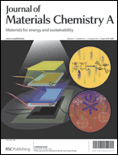
Journal of Materials Chemistry A
Advancing Sustainable Solutions for a Greener TomorrowJournal of Materials Chemistry A, published by the Royal Society of Chemistry, stands as a leading peer-reviewed journal in the fields of Chemistry, Materials Science, and Renewable Energy. With an impressive ranking within the top quartile (Q1) across these disciplines in 2023, this journal not only showcases groundbreaking research but also addresses pivotal challenges in sustainable materials and energy. Spanning from 2013 to 2024, it serves as a vital platform for scientists and engineers to present innovative solutions and advances in materials that directly contribute to environmental sustainability. Accessible to a broad audience, the journal's contributions are essential for anyone engaged in the development of new materials and technologies that promise to shape a greener future. With a commitment to high-quality open access publishing, the Journal of Materials Chemistry A is instrumental in disseminating impactful research to enhance scholarly communication and foster collaboration in an increasingly interconnected research landscape.

Biofuels Bioproducts & Biorefining-Biofpr
Innovating Tomorrow’s Energy Through Biofuels and BioproductsBiofuels Bioproducts & Biorefining (Biofpr), published by WILEY, stands at the forefront of research dedicated to the sustainable production and utilization of biofuels and bioproducts. With its robust impact, as evidenced by its placement in the Q2 quartile across both Bioengineering and Renewable Energy, Sustainability and the Environment categories, this journal provides a vital platform for disseminating high-quality research aimed at advancing bio-refining technologies and bio-product innovations. Covering a wide range of topics from production methodologies to environmental impacts, Biofpr serves as an essential resource for researchers, professionals, and students eager to contribute to the evolving领域 of renewable energy solutions. Its consistent performance in the Scopus rankings further underscores its importance, ranking #78 in Renewable Energy and #51 in Chemical Engineering, making it an indispensable read for those committed to sustainability and scientific advancement in the biofuels sector.

TRANSACTIONS OF TIANJIN UNIVERSITY
Championing high-quality contributions in a dynamic academic landscape.TRANSACTIONS OF TIANJIN UNIVERSITY, published by SpringerNature, is a premier journal in the field of multidisciplinary research, boasting an impressive Q1 ranking and placing within the top 93rd percentile of its category according to Scopus. With an ISSN of 1006-4982 and E-ISSN of 1995-8196, this journal facilitates insightful and innovative contributions that span various disciplines, making it a vital resource for academics and professionals alike. Established in 2004, the journal continues to thrive with a commitment to advancing knowledge and fostering collaboration in scientific inquiry. TRANSACTIONS OF TIANJIN UNIVERSITY aligns with global research trends and offers a platform for the dissemination of high-quality research findings, promoting interdisciplinary approaches to solving complex problems. Located in China, its influence extends well beyond national borders, appealing to a diverse readership eager to explore the latest advancements and discussions in the multidisciplinary arena.

Ingenieria
Fostering collaboration in the world of engineering.Ingenieria, published by the Universidad Distrital Francisco José de Caldas, is a distinguished open-access journal that has been advancing the field of engineering since 1993. With its ISSN 0121-750X and E-ISSN 2344-8393, the journal serves as a vital resource for researchers, professionals, and students seeking to contribute to and stay informed about the latest advancements in general engineering. Based in Bogotá, Colombia, Ingenieria aims to foster a diverse array of scholarly articles and studies that engage with contemporary challenges in the engineering discipline, penetrating crucial areas such as sustainability, technology development, and innovative engineering practices. This journal is committed to promoting global collaboration and knowledge sharing through its open-access model, allowing unrestricted access to high-quality research. Despite its current Scopus rank of #260 out of 307 in general engineering, the publication is on an upward trajectory, reflecting its potential for impactful contributions to both local and international engineering conversations as it converges towards a dynamic focus from 2020 to 2024.

CHEMICAL AND PETROLEUM ENGINEERING
Driving Efficiency Through Groundbreaking ResearchChemical and Petroleum Engineering is a prestigious academic journal dedicated to the advancement of knowledge in the fields of chemical engineering and petroleum technologies. Published by Springer, this journal serves as a vital resource for researchers, professionals, and students interested in the intricate processes and innovations that drive these industries. With an ISSN of 0009-2355 and an E-ISSN of 1573-8329, it has established a notable presence since its inception in 1965. Throughout its converged years, the journal has continually published impactful research that contributes to sustainability and efficiency within the sectors. Although it holds a Q3 ranking in Chemical Engineering and Fuel Technology and a Q4 ranking in Energy Engineering and Geochemistry, it is a noteworthy platform for emerging studies, fostering connections among scholars. Readers will find a wealth of information and ideas, but please note that this journal does not currently offer open access options. For those passionate about chemical and petroleum engineering, this journal is an essential part of staying informed and engaged with the latest scientific advancements.
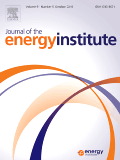
JOURNAL OF THE ENERGY INSTITUTE
Catalyzing Change through Interdisciplinary Energy StudiesJOURNAL OF THE ENERGY INSTITUTE, published by Elsevier Science Ltd, is a leading interdisciplinary journal dedicated to the advancing fields of energy engineering and technology. With its ISSN 1743-9671 and E-ISSN 1746-0220, this journal has established a prominent reputation, evident from its impressive impact factor and strong rankings across multiple categories, achieving Q1 status in fields such as Condensed Matter Physics, Control and Systems Engineering, and Energy Engineering and Power Technology. As a pivotal resource for researchers, professionals, and students alike, the journal covers a comprehensive spectrum of topics in energy, including recent innovations in renewable energy technologies, sustainable practices, and advancements in fuel technologies. Researchers are encouraged to explore its open-access options for broad dissemination of knowledge, contributing to a more sustainable and energy-efficient future. With a converged history from 2004 to 2024, the JOURNAL OF THE ENERGY INSTITUTE remains a critical platform for cutting-edge research and development in the energy sector, promoting impactful solutions to global energy challenges.